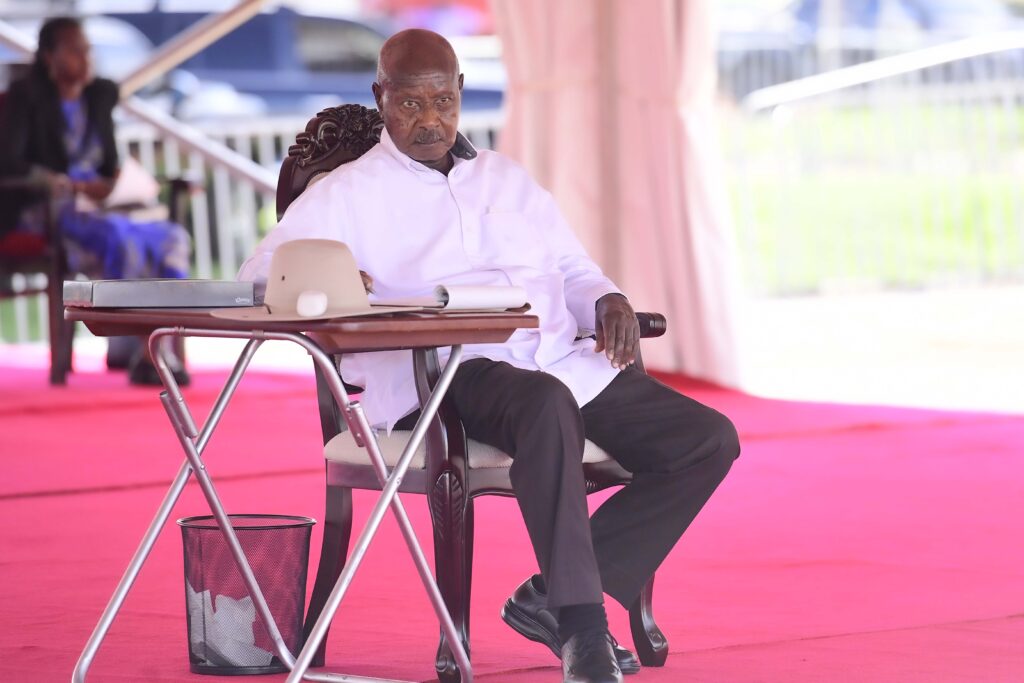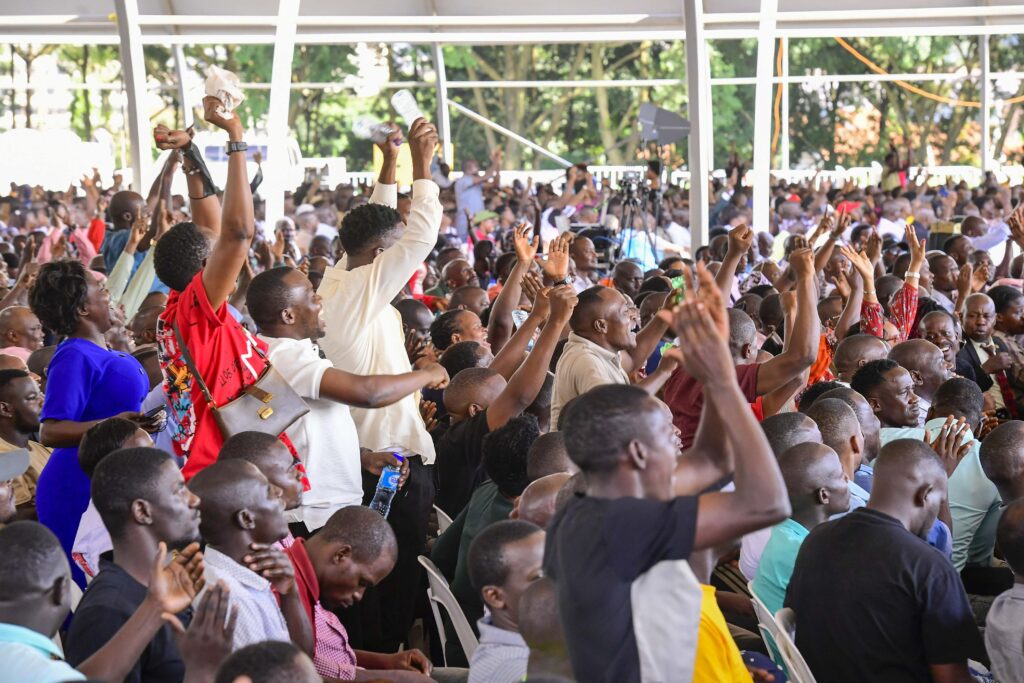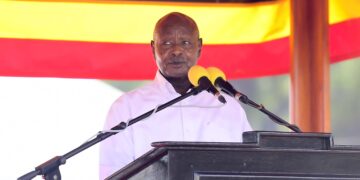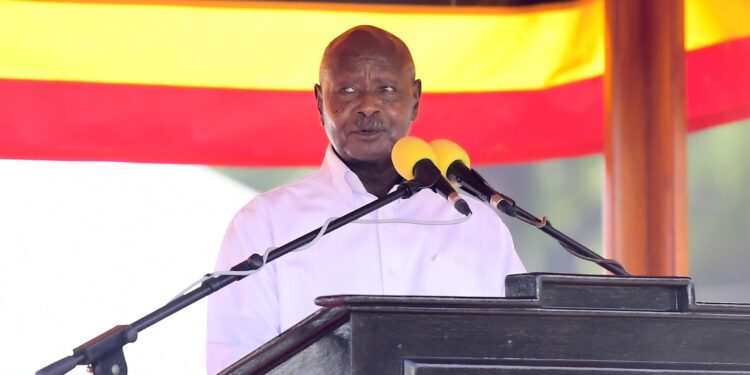President Yoweri Kaguta Museveni has disagreed with traders who say that there are many taxes in the country being imposed on them.
“The first claim is that there are too many taxes in Uganda. This is not true and that is why I’m here to talk with you,” he said.
The President made the remarks on Tuesday 7th May, 2024 while meeting traders from Kampala and upcountry districts at Kololo Ceremonial Grounds.
President Museveni’s meeting with the traders follows a protest by the latter over what they called unfair taxes imposed on them by the Uganda Revenue Authority (URA) and the unfair implementation of the Electronic Fiscal Receipting and Invoicing Solution (EFRIS).

EFRIS is an automated compliance process established by the URA which aims to handle the allocation and centralised tracking of all invoices and receipts by specified taxpayers in Uganda.
According to the President, the policy of the government on taxes is quite deliberate and they normally don’t tax what “builds Uganda” and if they do, they impose a smaller tax.
“When we came from the bush, there was a tax on export of coffee, it was called coffee export tax, we abolished that tax. There’s no tax on the export of coffee or any other product which is sold outside and yet when NRM came into government, that was the main source of tax of the government. Show me just one tax on a product from Uganda. So, there is no tax on exports in Uganda. There’s no tax on individuals (Head tax), we abolished that,” he said.
“When I buy matooke from Mbarara or any other part of the country, the only thing I need is a licence and we are having battles in Kampala here with people who have many tax imposes. The view of the government is that apart from licences, internal trade produce should not be taxed. I was having battles with the local governments on the tax imposed on gonja traders in Lukaya and all those who have been doing internal trade, we have been fighting them. There’s no import tax on products brought from the factory within Uganda and trading within the country. And actually, when I was preparing to come here, I spoke with one of our young people.”

President Museveni also informed the traders that the import tax is only for those who import goods to Uganda.
He further advised the traders that if they want to fully benefit from the business, they should make the right enterprise selection of engaging themselves in local manufacturing and exportation.
“Traders are of different types. There are those traders who buy our locally made products, traders who sell our products outside, and traders like you who import products to Uganda. So when we are discussing, we should be clear. Therefore, the internal traders, distributors and exporters either don’t pay taxes or pay smaller taxes. Exporters don’t even pay at all,” he said.
“But even for those who import, the taxation depends on what you import. If you import machinery for factories, you don’t pay any tax. If you import raw materials, you don’t pay tax. There is what we call intermediate products, there you pay the East African tax of 10 percent. If you import pharmaceuticals, initially you don’t pay taxes but in future when we start making our own drugs, we shall have to protect our pharmaceuticals by imposing taxes on the imported ones. Therefore, the issue which is on the table is the import of consumer goods which are not medicine, machinery, raw materials and which are not intermediate products. This is what we are talking about. And our taxation on those products is deliberate. It is these people [officials] who don’t explain to you clearly and guide you. That is why I’m very happy to be here to discuss this with you.”
President Museveni explained that it has been more than 60 years since African countries got independence but many of them are still backward today and one of the problems is importation without limit (endlessly).

“The shirt I’m putting on is made in Uganda and when I put it on, 100 percent of that money remains here in Uganda and this also creates six levels of jobs. Now you who create this type of shirt from China, if it costs 5 USD here, the only value you add is clearing and forwarding. If you put all that in money terms, you may find it’s like 10 percent. 90 percent of the value went out and the jobs went out. Uganda consumes 276 million metres of textile. A factory like Nytil makes 25 million metres so in order to cover us properly, we need 11 factories like Nytil which employs over 1500 people in the factory alone,” he stressed.
“Uganda is spending 880 million USD on importing textiles. That means all the money (900 million USD) is spent on importing textiles. That is why we say how long shall we go on with this haemorrhage? That is why we say, we tax in order to encourage our people to buy our Ugandan products so that we close off the importation and if we are to import, we import very important things like the aeroplanes which we cannot make here. This is the main point, yes, we are looking for taxes and we are looking for taxes from areas mainly “sucking blood from us” and the ones which give us blood, we either don’t tax or tax a little.”
President Museveni revealed that the NRM government has been able to register success in the dairy sector and currently, Ugandans have been able to set up factories and add value to the milk and beef.

“What we have done with milk, we can do it in textile, leather and other products. What I want to see is you graduating from importation to making products here. We want you to do business but which businesses? To find all these tents full of importers is a shame. Therefore, it is the fault of these people of yours (the leaders). We should take the NRM line of building ourselves and stop this haemorrhage.”
On the other hand, President Museveni said he doesn’t see any form of double taxation as traders claim.
“I don’t see any double taxation here. You only pay once. And you don’t pay what the other one has already paid, and it protects our factories. Now, what you should study with your leaders and the tax people is what you said about EFRIS, that it is not able to detect who buys on credit and who does the hawking, and they assume that everyone is buying cash. I want your leaders and the tax people to sit down and fine-tune that part,” he said.
“I have studied, and I don’t see any danger of VAT because of our big aims. Therefore, this tax whose part is concentrating on the narrow spectrum of imported items, I don’t think you should oppose it. You would be wrong if you did so. Now the penalties for non-performance should also stop, I stopped them. I don’t want these harsh punishments, let people be helped to understand the new process like the EFRIS.”
“I direct URA not to insist on the EFRIS Machine. Those who can buy it, let them buy it, those who can’t, let them use the smartphone. And there shouldn’t be penalties for not using the EFRIS Machine.”












